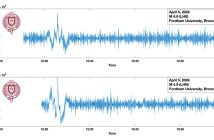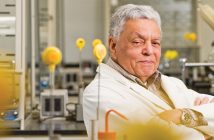Raj P. Kandpal, Ph.D., is grappling with two leading causes of cancer-related deaths. The newest member of the biology department is studying the genes involved in the initiation, progression and metastasis of breast and prostate cancer. A scientist with a curious soul, he is also working on a project that involves genetic deafness. “We are trying to characterize genes that can cause cancer and allow migration of cancer cells from the original site of the tumor to distant sites in the body,” said Kandpal. “If we can stop cancer from spreading, then it provides the patient [with a]better chance to fight the disease.
This is true in breast and prostate cancer and, really, any cancer.” Working with a grant from the U.S. Department of Defense, Kandpal is studying breast cancer that is not inherited, but is sporadic in nature. His most significant finding to date is that Rho GAP (GTPase Activating Protein) – a protein involved in the cell-signaling that is responsible for normal cellular morphology- is altered in breast cancer cells.
“Rho GAP may be responsible for some of the sporadic breast cancers and we are now researching how this protein functions in cancer cells and how other interacting proteins may modulate Rho GAP activity,” Kandpal said. “If we can better define these signaling pathways, then we can identify potential targets for therapeutic drugs that could be used to stop the growth of cancer cells.” Similarly, Kandpal is studying the spread of prostate cancer. “Cancer and non-cancer cells have different profiles of gene expression,” he explained. “If we can show the genes that are over- or under-expressed [or over- or underactive]in a cancer cell, we can say that these genes may play some role in the altered behavior of a cell.”
By comparing normal and metastasizing prostate cells, he has identified several genes showing altered expression. So far he has found significantly higher levels of an oncogene called Axl/UFO in metastatic prostate carcinoma. Oncogenes are regulatory proteins required for the growth of normal cells. However, abnormal levels or over-expression of oncogenes can cause unrestricted growth of a cell as seen in cancers. Kandpal is now searching for other proteins that he believes are responsible for the UFO/Axl-mediated signaling that turns normal prostate cells into metastasized prostate cells.
The goal of these studies is to identify targets that can be clinically exploited to develop new drugs. “For better clinical management of prostate cancer, it is essential that we understand its molecular basis,” he said. “The information that we obtain from laboratory research can be used by drug companies for the development of possible medications that will work with these cancers.” Lastly, Kandpal is studying the cause of genetic deafness. One in 1,000 babies born each year is affected with some kind of hearing disorder and approximately one-half of these deafness cases are genetic in nature. This study was spawned by Kandpal’s fascination with the miniscule inner ear. “It appears very simple and yet is so complex,” he said. “It is estimated that there are over 100 genes responsible for genetic deafness and, so far, more than a dozen have been identified.
Our interest is to identify candidate genes responsible for hearing disorders and to look for the role of specific regulatory genes in the development of the inner ear.” Kandpal and his colleagues in the lab have cloned a gene involved in X-chromosome- linked deafness (DFN3) and they are working to determine how it works within the human ear. His research on hearing and deafness was supported by a grant from the National Institutes of Health. “The human genome project has really made every aspect of the research we do a little easier,” he said. “We are currently focusing on the breast cancer project and are applying for grants to continue working on each of the other projects.” Kandpal came to Fordham last year from Temple University School of Medicine, where he was an assistant professor of molecular biology and genetics.
Prior to that, he trained as a biochemist under Nobel Laureate Paul Boyer at UCLA, and subsequently worked on human genetics studies at Yale. “I was working at a medical school and Fordham seemed like a welcome host for me,” said Kandpal. “The biological sciences department here seemed genuinely interested in the progress of their faculty as well as their students, which is not true in many schools. The faculty here is very friendly and extremely cooperative, the students are a pleasure to interact with and the administration is supportive of the faculty’s efforts in teaching and research. After a year at Fordham, I am delighted to say that I made the right choice.”


